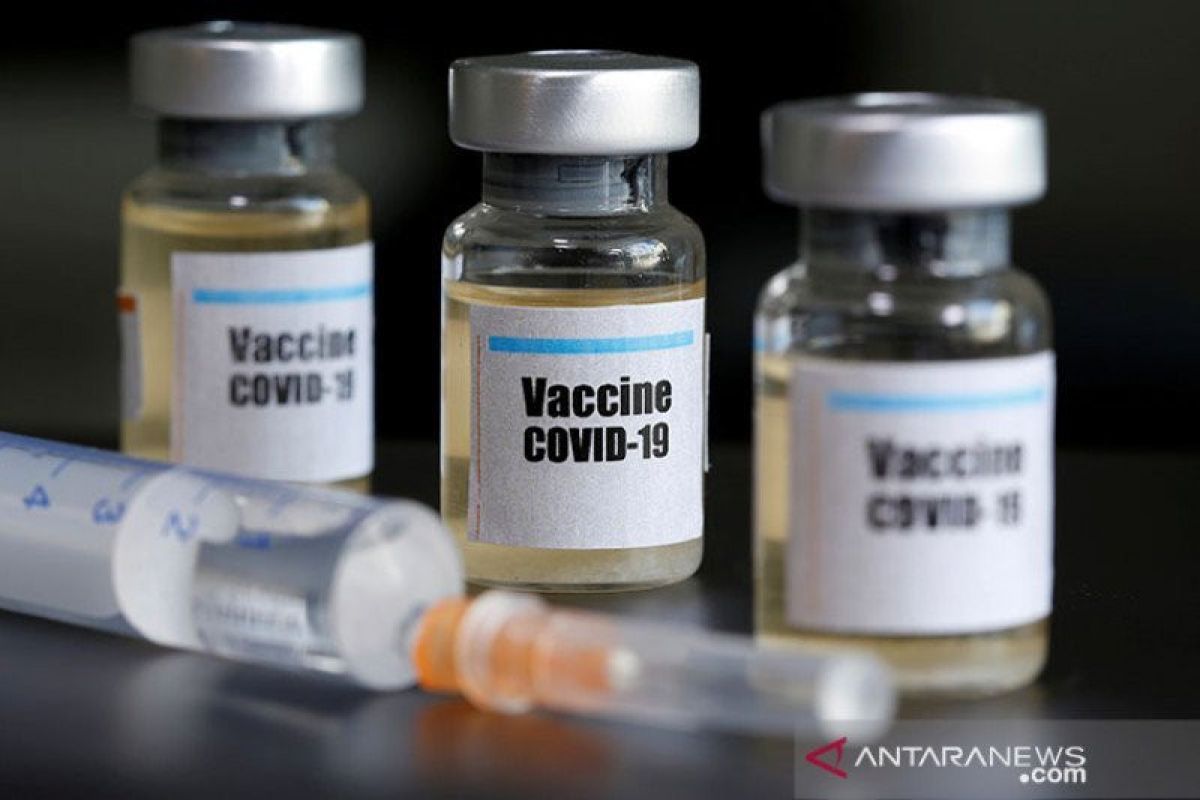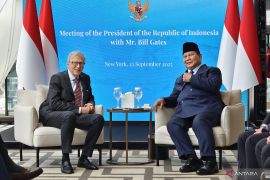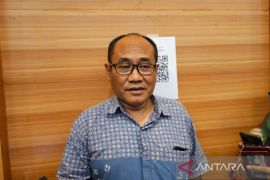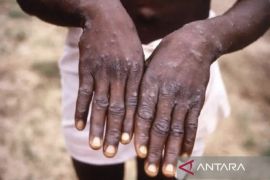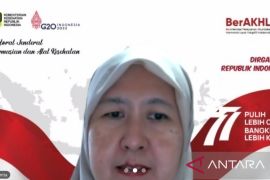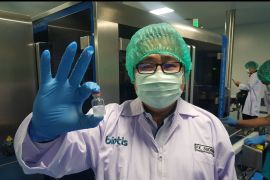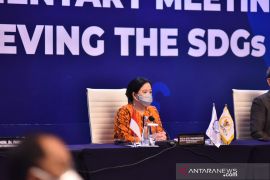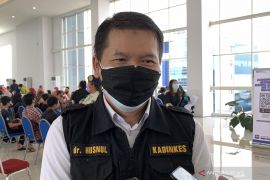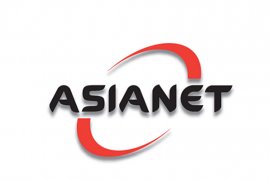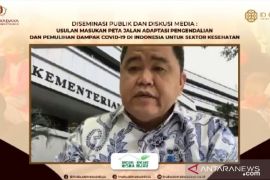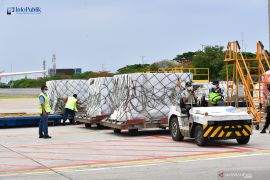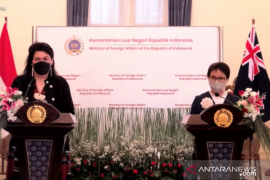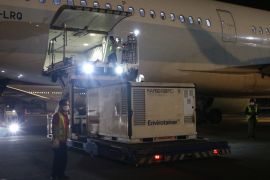Likewise, this year has shown us how interconnected our economies are. Allow me to use one example you are all familiar withJakarta (ANTARA) - Globally, the number of weekly COVID-19 cases and deaths have increased for over a month.
During the week of November 15-21, 2021, nearly 3.6 million new confirmed cases and over 51 thousand deaths were reported, thereby reflecting a six-percent increase in cases and deaths as compared to the previous week, based on data of the WHO.
The European region reported an increase of 11 percent in new weekly cases, while the other regions recorded a decrease or incidence similar to the previous week.
The largest proportionate decrease was reported from the South-East Asian region, at 11 percent, followed by the Eastern Mediterranean Region, at nine percent.
While the Western Pacific Region and the Region of the Americas reported relatively stable case incidence, they both reported large increases in new weekly deaths, at 29 percent and 19 percent respectively.
In contrast, the African and the South-East Asian regions reported a 30-percent and 19-percent decrease in new weekly deaths.
The cumulative count of confirmed cases reported globally is currently at over 256 million, while the cumulative figure of deaths crosses 5.1 million.
Related news: Over 93.1 million Indonesians receive second vaccine dose
Indonesian Foreign Minister Retno Marsudi stated that the world currently has a powerful weapon to defeat COVID-19.
A total of 24 COVID-19 vaccines have been approved for use, and around 7.6 billion shots have been administered globally.
“If we see the results, they are apparent. The global economy is showing signs of life and is projected to grow 5.9 percent in 2021 and 4.9 percent in 2022. Borders are re-opening and international travel has gradually resumed. In-person meetings have begun to take place, including the recent G-20 and COP summits,” the minister stated at the Global Town Hall 2021.
Marsudi noted that images of crowded football stadiums and concerts offer a ray of hope to people that life would soon return to normal.
"However, let us be clear that we are still in the midst of the pandemic. We have recorded nearly 260 million cases globally and 5.2 million deaths due to COVID-19," she noted.
The minister remarked that these figures are four to five folds higher than they were a year ago. The WHO noted an increasing trend in global weekly cases, with surges in the Americas and Europe.
Related news: 44% Jakartans have developed immunity to COVID: official
Several factors contribute to prolonging the pandemic, such as inconsistent public health measures and hasty reopening.
However, the WHO has made it clear that “the pandemic persists in large part because inequitable access to tools persists”.
The minister noted that from the start, Indonesia had called for fair and equitable distribution of vaccines. President Joko Widodo has voiced his concerns during bilateral, regional, and multilateral forums.
“I also co-chair the COVAX Advance Market Commitment Engagement Group established to facilitate access to vaccines for 92 countries. We knew vaccines would be scarce, and scarce goods are often sold to the highest bidder only. This is exactly what is happening right now,” she affirmed.
Some 64.99 percent of people in high-income countries have been vaccinated, with at least one dose, as compared to 6.48 percent in low-income countries, she remarked.
More than 80 percent of the vaccines have gone to G-20 countries as compared to 0.4 percent to low-income countries.
On a daily basis, six times more boosters are administered globally than primary doses in low-income countries, Marsudi pointed out.
Some 56 countries did not meet the WHO’s target to vaccinate 10 percent of their population by September 2021, and nearly 80 countries may not reach the 40-percent vaccination target by this year’s end.
Related news: Health protocols, vaccination key for safe year-end holidays: govt
All the while, at least 100 million doses could go unused and expire in G7 countries in 2021 and the number of wasted doses could rise to 800 million by mid-2022.
“If all the shots administered globally so far were distributed equitably, we would have reached our 40-percent target in every country by now,” the minister stated.
Instead, she noted, several countries rely on the COVAX facility as the only means to get vaccines. COVAX has shipped over 507 million doses. However, COVAX does not produce vaccines, and it has already fallen short of its target to deliver two billion doses this year.
We still need 550 million shots to meet the WHO’s 40-percent vaccination target in every country. Global production currently stands at nearly 1.5 billion doses per month, so there is actually sufficient vaccines from a supply perspective, she remarked.
“But will they be distributed equitably this time around? Challenges to vaccinate the world do not stop here. We must get the shots into as many arms as possible, and this is no simple task. There are misinformation and hoaxes to counter, as they contribute to vaccine hesitancy,” Marsudi remarked.
The minister noted that not all countries were prepared to receive large number of doses, let alone have a national strategy to distribute them.
On average, low-income countries have to increase their health spending by 56.6 percent to cover the cost of vaccinating 70 percent of their population, as compared to 0.8 percent for high-income countries.
Related news: Govt readies 1,200 hospitals to anticipate third COVID-19 wave
“In the short run, I have a few suggestions to make. First, ensure all countries can meet the WHO’s vaccination target. This requires commitment to equity. All pledges of dose-sharing must be fulfilled immediately,” she emphasized.
Marsudi remarked that wealthier countries, with an oversupply of doses, or with high vaccination coverage, should consider sharing their doses. Vaccine manufacturers also need to start allocating more doses to COVAX.
“Second, scale up global vaccine production. Diversification of vaccine manufacturing to developing countries would contribute to such effort,” the minister stressed.
This requires strengthening of necessary infrastructures, research centers, storage facilities, and human resources. Export restrictions on raw materials must end. Technology transfer should be facilitated, she stated.
Related news: Indonesians permitted to enter Saudi Arabia without booster vaccine
Support of Europe
At the Global Town Hall 2021, European Commission President Ursula von der Leyen noted that Europeans insisted to agree on a common target to vaccinate 70 percent of the global population by mid-next year.
"We did that because we know that we can only get out of this pandemic together," she affirmed.
If the virus continues to spread even just in one world region, new variants may emerge. The pandemic will only be over when all continents are safe.
“Likewise, this year has shown us how interconnected our economies are. Allow me to use one example you are all familiar with,” von der Leyen noted.
Last September, there was a surge in COVID cases in South East Asia. Several factories in part of South East Asia had to shut down. The economic shockwaves spread to the entire world.
Global supply chains for cars, computers, and smartphones were disrupted owing to the lack of electronic components.
Not only is our health connected but also our economic recovery. Hence, we are really glad that the headline goal of Indonesia's upcoming G20 Presidency will be “Recovering Together, Recovering Stronger”, she remarked.
Von der Leyen affirmed that the first step to a strong recovery is equitable global access to COVID vaccines. This was Europe's policy from the very outset of the crisis.
Related news: Indonesia receives 4.3 million AstraZeneca vaccine doses
“When you read about vaccine diplomacy in the Indo-Pacific, Europe is not the first power to be mentioned by media reports,” she stated.
She noted that since December 2020, the European Union had exported over 550 million doses of COVID vaccines to countries in the Asia-Pacific.
“All in all, we have exported almost 1.2 billion doses to the rest of the world – more than we have used inside Europe. Even if we are a faraway continent, we have been an essential part of the Asian vaccine supplies,” she stated.
Beyond exports, she noted that Europe has also been a strong supporter of global vaccine solidarity.
“We were among the leading forces behind the creation of COVAX – the global facility providing vaccines to low- and middle-income countries. The European Union and its member states – we call ourselves “Team Europe” – have contributed over one third of the COVAX budget, and roughly one-third of the COVAX doses are going to the Asia-Pacific,” Von der Leyen stated.
"Nonetheless, we know that we need to step up the world's vaccine manufacturing capacities. This is why, in our new Indo-Pacific strategy, we propose to work together on pharmaceutical supply chains," she remarked.
Solidarity and political commitment from all countries are deemed necessary to bring the COVID-19 pandemic to an end.
Now is the time for action. We have enough tools at our disposal to end this pandemic, including vaccines. However, tools are just tools if not used properly.
To make them work, solidarity and political commitment from all countries are deemed necessary. It is only then can we recover together and recover stronger from this pandemic.
Related news: Regulation in tourist attractions must be tightened before holidays
Related news: New Year holiday: Civil servants asked to cancel collective leave
Editor: Fardah Assegaf
Copyright © ANTARA 2021
